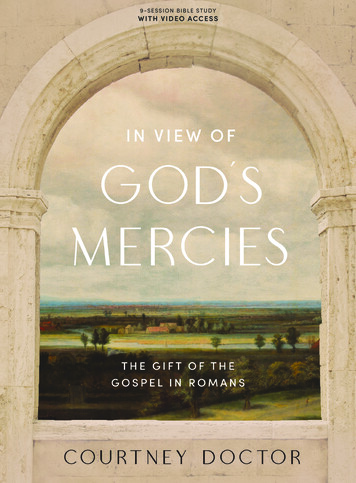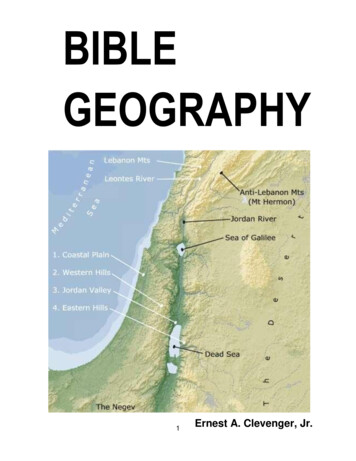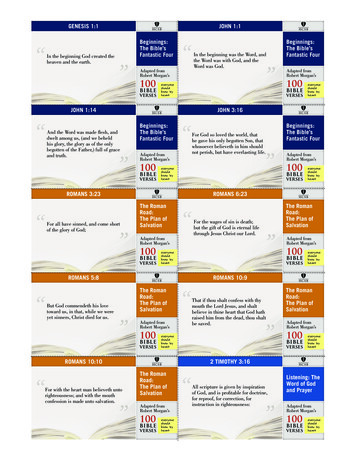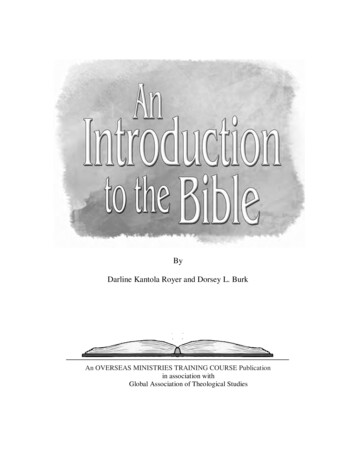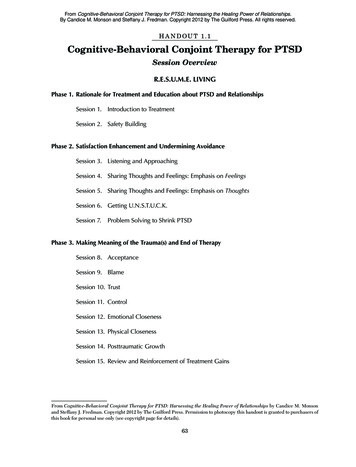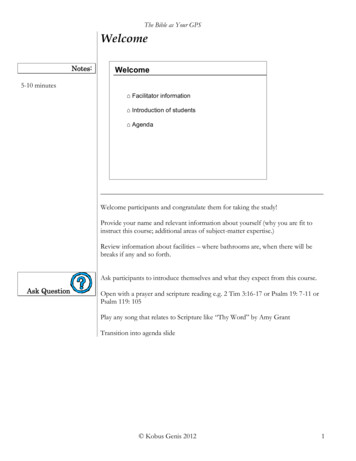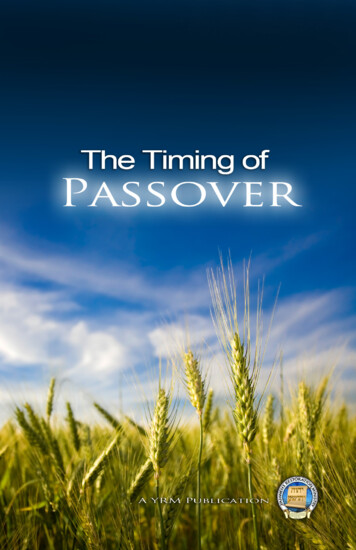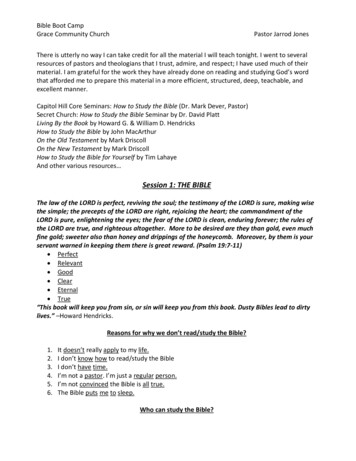
Transcription
Bible Boot CampGrace Community ChurchPastor Jarrod JonesThere is utterly no way I can take credit for all the material I will teach tonight. I went to severalresources of pastors and theologians that I trust, admire, and respect; I have used much of theirmaterial. I am grateful for the work they have already done on reading and studying God’s wordthat afforded me to prepare this material in a more efficient, structured, deep, teachable, andexcellent manner.Capitol Hill Core Seminars: How to Study the Bible (Dr. Mark Dever, Pastor)Secret Church: How to Study the Bible Seminar by Dr. David PlattLiving By the Book by Howard G. & William D. HendricksHow to Study the Bible by John MacArthurOn the Old Testament by Mark DriscollOn the New Testament by Mark DriscollHow to Study the Bible for Yourself by Tim LahayeAnd other various resources Session 1: THE BIBLEThe law of the LORD is perfect, reviving the soul; the testimony of the LORD is sure, making wisethe simple; the precepts of the LORD are right, rejoicing the heart; the commandment of theLORD is pure, enlightening the eyes; the fear of the LORD is clean, enduring forever; the rules ofthe LORD are true, and righteous altogether. More to be desired are they than gold, even muchfine gold; sweeter also than honey and drippings of the honeycomb. Moreover, by them is yourservant warned in keeping them there is great reward. (Psalm 19:7-11) Perfect Relevant Good Clear Eternal True“This book will keep you from sin, or sin will keep you from this book. Dusty Bibles lead to dirtylives.” –Howard Hendricks.Reasons for why we don’t read/study the Bible?1.2.3.4.5.6.It doesn’t really apply to my life.I don’t know how to read/study the BibleI don’t have time.I’m not a pastor. I’m just a regular person.I’m not convinced the Bible is all true.The Bible puts me to sleep.Who can study the Bible?
Anyone can study the Bible, but only those who have the Holy Spirit can understand the Bible We need the Spirit of God to understand the Scriptures of GodNow we have received not the spirit of the world, but the Spirit who is from God, that we mightunderstand the things freely given us by God. And we impart this in words not taught by humanwisdom but taught by the Spirit, interpreting spiritual truths to those who are spiritual.The natural person does not accept the things of the Spirit of God, for they are folly to him, andhe is not able to understand them because they are spiritually discerned. (1 Corinthians 2:12-14)Why must study the Bible?1. It’s the source of Truth.a. “The truth is there. The truth about God/man/life/death/you and me/men,women, children, husbands, wives/dads, mothers/friends and enemies/how youought to be at work & home/how you ought to eat and drink/ how you ought tothink. What a resource. Cherish it.” John MacArthurb. Sanctify them in the truth; your word is truth. (John 17:17)c. “If you abide in my word, you are truly my disciples, and you will know thetruth, and the truth will set you free.” (John 8:31b-32)i. Like the man who works on a math problem and finds the answer—he’sfree. Just like the scientist in the lab pouring the different solutions intotest tubes, he stays with it until he says, “At last! I found it!”—the he’sfree. Humanity will search and struggle and grapple and grope for thetruth until it finds it—then people are genuinely free. – John MacArthur 2. It’s the source of happinessMany know their Bible but don’t obey it, forfeiting their happiness.It’s about heart attitude, not legalism.The precepts of the LORD are right, rejoicing the heart (Ps 19:8a)But he said, “Blessed rather are those who hear the word of God and keep it!” (Luke11:28)And we are writing these things so that our joy may be complete. (1 John 1:4)Blessed is the one who reads aloud the words of this prophecy, and blessed are thosewho hear, and who keep what is written in it, for the time is near. (Rev 1:3)These things I have spoken to you, that my joy may be in you, and that your joy may befull.(John 15:11)
3. It’s the source of victoryI have stored up your word in my heart, that I might not sin against you. (Ps 119:11)a. Victory over Satan (Matt 4:1-11)b. Victory over demons (Luke 4:33-36)c. Victory over temptationAnd take the helmet of salvation, and the sword of the Spirit, which is the word ofGod. (Ephesians 6:17)4. It’s essential for spiritual growthLike newborn infants, long for the pure spiritual milk, that by it you may grow up intosalvation (1 Peter 2:2)a. We want itb. We need itc. We can’t grow without it5. It’s essential for spiritual maturity (Hebrews 5:11-14)a. Timeb. Trainingc. Applicationd. Obedience6. It’s essential for spiritual effectivenessAll Scripture is breathed out by God and profitable for teaching, for reproof, forcorrection, and for training in righteousness, that the man of God may be competent,equipped for every good work. (2 Tim 3:16-17)a. All Scriptureb. Doctrine /Teachingc. Rebuked. Correctione. Training“If you didn’t know any more about your business or profession than you know about Christianityafter the same number of years, what would happen?” Howard HendricksHow do I read the Bible?1. Prayerfullya. Divine interaction with the Holy Spirit2. Humblya. Come on His termsb. Come in surrenderc. Submit under His authority to speak into my life , sin , and mess3. Carefully
a. Context , Context , Context4. JoyfullyI will run in the way or your commandments when you enlarge my heart. (Psalm 119:32)5. Simply6. Confidently7. Consistentlya. Don’t dodge the hard or confusing texts.8. Diligently9. intentionallya. Bibleb. Penc. Journal/Notebook10. Personallya. Fall in love with the Author – God the Holy SpiritSession 2: What is the BIBLE?Many people want A word from God, but don’t want THE Word of God. But the Bible is THE Wordof God handed down to us. You own a Bible, but does the Bible own you? The Bible is a unito 66 Bookso Written over a period of 1400 yearso 40 Authors The Bible is a divine booko A revelation about God and uso God is the direct and ultimate author of Scripture “The Bible is the Word of God in such a way that when the Bible speaks, Godspeaks.” – B.B. Warfield What God wants communicatedAll Scripture is breathed out by God and profitable for teaching, forreproof, for correction, and for training in righteousness (2 Tim 3:16)He answered, “Have you not read that he who created them from thebeginning made them male and female, and said, “’Therefore a man shallleave his father and his mother and hold fast to his wife, and the two shallbecome one flesh’? (Matt 19: 4-5)“I still have many things to say to you, but you cannot bear them now.When the Spirit of truth comes, he will guide you into all the truth, for hewill not speak on his own authority, but whatever he hears he will speak,and he will declare to you the things that are to come. He will glorify me,
for he will take what is mine and declare it to you.” (John 16:12-14)o Five Implications of Divine Inspiration The Bible is aliveFor the Word of God is living and active, sharper than any two-edgedsword, piercing to the division of soul and of spirit, of joints and ofmarrow, and discerning the thoughts and intentions of the heart. (Heb4:12) The Bible is trueThe sum of your word is truth, and every one of your righteous rulesendures forever. (Psalm 119:160) The Bible is without errorThe words of the LORD are pure words, like silver refined in a furnace onthe ground, purified seven times. (Psalm 12:6)The Bible can only be understood through the Holy SpiritThe natural person does not accept the things of the Spirit of God, for theyare folly to him, and he is not able to understand them because they arespiritually discerned. (1 Cor 2:14)The Bible is authoritative“My sheep hear my voice, and I know them, and they follow me.” (John10:27) The Bible is a human booko The Bible was written by particular people, at a particular time, in a particular place,for a particular reason.“The Words of the Preacher, Son of David, king of Jerusalem ” (Ecc 1:1)“When you come, bring the cloak that I left with Carpus at Troas, also the books,and above all the parchments” (2 Tim 4:13)o Verbal - Plenary Inspiration “God superintended the human authors so that, using their own individualpersonalities, they composed and recorded, without error, His revelation toman in the words of the original manuscripts.” -Charles Ryrie Dual authorship For no prophecy was ever produced by the will of man, but men spokefrom God as they were carried along (moved) by the Holy Spirit. (2 Peter1:21) who through the mouth of our father David, your servant, said by theHoly Spirit (Acts 4:25a)
Then the LORD put out his hand and touched my mouth. And the LORDsaid to me, “Behold, I have put my words in your mouth.” (Jeremiah 1:9)The Bible is inerranto Without erroro Jesus testifies to the Bible’s inerrancyMatt 4:-11, Matt 5:17-18o Texts questioned by “authorities” that Jesus deemed accurate, reliable and true And Jesus said to him, “See that you say nothing to anyone, but go, showyourself to the priest and offer the gift that Moses commanded, for a proofto them.” (Matt 8:4) Truly, I say to you, it will be more bearable on the day of judgment for thelad of Sodom and Gomorrah than for that town (Matt 10:15) This was to fulfill what was spoken by the prophet Isaiah (Matt 12:17) For just as Jonah was three days and three nights in the belly of the greatfish, so will the Son of Man be three days and three nights in the heart ofthe earth. (Matt 12:40) Matt 19:3-5, Matt 24:38-39The Bible is authentico Science “Sun stood still” Rainfall For as the rain and the snow come down from heaven and do notreturn there but water the earth, making it bring forth the sprout,giving seed to the sower and bread to the eater (Isaiah 55:10) Fixed orbits of heavenly bodies Jeremiah 31:35-36 Balance (Isostasy) Who has measured the waters in the hollow of his hand andmarked off the heavens with a span, enclosed the dust of the earthin a measure and weighed the mountains in scales and the hills in abalance? (Isa 40:12)
Herbert Spencer 1820-1903 Time- In the beginning Force- God Action - Created Space- the heavens Matter- and eartho Explanations (contradictions) Read the full contextGo back to original languagesScribal error Examples: WHO WAS SEEN AT THE TOMB?(NIV) Contradiction 1: An angel of the Lord came down from heavento the tomb. Matthew 28:2(NIV) Contradiction 2: As they entered the tomb, they saw a youngman dressed in a white robe. Mark 16:5(NIV) Contradiction 3: Suddenly two men in clothes that gleamedlike lightning stood beside them. Luke 24:4(NIV) Contradiction 4: Two angels in white, seated where Jesus'body had been. John 20:12 Conflicting Creation AccountsGenesis 1 – Chronological OrderGenesis 2 – Topical Order Who Killed King Saul?o Saul said to his armor-bearer, Draw your sword and run methrough, or these uncircumcised fellows will come and runme through and abuse me. But his armor-bearer wasterrified and would not do it. So Saul took his own swordand fell on it (1 Samuel 31:4)o [Saul] then said to me, "Stand over me and kill me! I am inthe throes of death but still alive.' So I stood over him andkilled him (2 Samuel 1:9-10) What about 2 Samuel 21:12?o Saul slain/struck down by Philistines?
Slay harag (v) and chalal (n)Nakah to conquer, destroy, defeato Prophecy The Bible is Completeo All Scripture is breathed out by God and profitable for teaching, for reproof, forcorrection, and for training in righteousness, that the man of God may becompetent, equipped for every good work. (2 Tim 3:16-17)o if anyone adds to them, God will add to him the plagues described in this book,and if anyone takes away from the words of the book of this prophecy, God willtake away his share in the tree of life and in the holy city, which are described inthis book.(Rev 22:18b-19)The Bible is Sufficiento For SALVATION .and how from childhood you have been acquainted with the sacredwritings, which are able to make you wise for salvation through faith inChrist Jesus.(2 Tim 3:15)o For PERFECTION All Scripture is breathed out by God and profitable for teaching, forreproof, for correction, and for training in righteousness, that the man ofGod may be competent, equipped for every good work. (2 Tim 3:16, 17)o For HOPE For whatever was written in former days was written for our instruction,that through endurance and through the encouragement of the Scriptureswe might have hope. (Rom 15:4)o For BLESSING Therefore put away all filthiness and rampant wickedness and receive withmeekness the implanted word, which is able to save your souls. But theone who looks into the perfect law, the law of liberty, and perseveres,being no hearer who forgets but a doer who acts, he will be blessed in hisdoing (James1:21,25) The Bible is the Grand-Story-Teller
Session 3: How was the Bible put together? Written over a period of 1600 years40 Authors, including:o Moses - An Egyptian-trained scholaro Joshua – A generalo David & Solomon – Kingso Amos – A farmero Peter –A fishermano Matthew – A tax- collectoro Paul – A Rabbi3 Languageso Old Testament Hebrew Aramaic (Ezra & Daniel)o New Testament GreekRevelation - God communicating to man what Hewants us to know (Hebrews 1:1)Inspiration - God superintending human writers tocompose and record His revelation to mankind (2Timothy 3:16; 2 Peter 1:21)Transmission - The ancient process of accuratelycopying Hebrew and Greek scriptures forsuccessive generationsCanonicity - God guiding the early church torecognize what books are inspiredTextual Criticism -The modern process ofcomparing existing Hebrew and Greek manuscriptsto determine what is originalTranslation - The process of translating the Biblefrom the original Hebrew and Greek into a modernlanguage
Interpretation - The process of a reader studying tounderstand what God’s Word means (2 Timothy2:15)Illumination - The process of the Holy Spirit helpingthe reader understand and apply the Bible (John16:13)Application - The process of putting into practicewhat the reader has learned (James 1:22) Writing Materialso Stone (Exodus 24:12, Deuteronomy 5:2, Joshua 8:31,32)o Papyrus (2 John 12, Revelation 5:1) Two layers of split papyrus reeds pressed and glued togethero Animal Skins (2 Timothy 4:13) Vellum – Calf or Antelope Parchment – Sheep or Goat Leather – Cow or Bullo Writing tools Stylus Chisel Pen and InkCopying Processo OT era only the first 5 books—The Law—were kept in the templeo Copies of the Law were lost, then found during reign of King Josiah (2 Kings 22:8 –23:3)o Books added History Joshua, Judges, Ruth, 1 & 2 Samuel, 1 & 2 Kings, 1 & 2 Chronicles,Ezra, Nehemiah, Esther
Poetry Job, Psalms, Proverbs, Ecclesiastes, Song of Solomon Prophets Isaiah, Jeremiah, Lamentations, Ezekiel, Daniel, Hosea, Joel, Amos,Obadiah, Jonah, Micah, Nahum, Habakkuk, Zephaniah, Haggai,Zechariah, Malachio The Masoretes (A.D. 500-1000) Used meticulous system of transcription Deep reverence for the text Specific rules regarding ink, the quality and size of parchment sheets Could not write God’s name with newly dipped pen Counted all paragraphs, words and letters to ensure perfectionExisting OT manuscriptso Masoretes 4 - 5 significant manuscripts Copies made around A.D. 900 and A.D. 1000o The Septuagint Evidence Hebrew OT translated into Greek in the 2nd or 3rd century B.C. 300 copies in existence Common Hebrew Bible Quoted by Jesus and the apostleso The Dead Sea Scrolls Discovered in caves in 1947 Date back to 100 B.C. Agreement between scrolls and Hebrew texts dated 1,100 years laterThe copying process of the NTo Originally written in Greeko Uncial – All capital letters, no punctuation or separation between wordso Small letters, punctuation, word and paragraph division used between 7th and 8thcenturiesReliability of Greek manuscriptso More reliable than OT textso Written between A.D. 45 – A.D. 90o 35-100 years after originals were writteno 4,000 – 5,000 NT Greek manuscripts (partial or complete) existNT manuscript evidence compared to other Greek literatureManuscriptDate of Oldest ManuscriptExistingCopies
Plato1,200 years later7Caesar900 years later10Herodotus1,300 years later8Aristotle1,400 years later5New TestamentOnly 35-100 years later4,000-5,000 Differences in English translationso Omitted phrases or verses John 5:3-4, 7:53-8:11; Mark 16:9-20Two theorieso Critical Text – believes oldest manuscripts are the most accurate NIV, NASV, RSV, etc.o Majority Text – believes the manuscripts that survived in the greatest number arethe most accurate King James New King JamesCanonicityo Who decided which books were inspired by God?o The Apocryphao Canon – Measuring RodSummaryo 66 Books were properly recognized by the early church as the completeauthoritative Scriptures, not to be added to or subtracted from.Tests of Canonicityo Is it authoritative (“Thus saith the Lord”)?o Is it prophetic (“a man of God”)? knowing this first of all, that no prophecy of Scripture comes from someone’sown interpretation. (2 Peter 1:20) Under the authority of a spiritual leader of Israel OT prophet, king, judge, scribe NT apostle of the church based on testimony of an original apostleo Is it authentic?o Is it dynamic? For the word of God is living and active, sharper than any two-edgedsword, piercing to the division of soul and of spirit, of joints and ofmarrow, and discerning the thoughts and intentions of the heart.(Hebrews 4:12)o Is it received (accepted by believers)?
And we also thank God constantly for this, that when you received theword of God, which you heard from us, you accepted it not as the word ofmen but as what it really is, the word of God, which is at work in youbelievers. (1 Thessalonians 2:13)The History of Canonizationo Old Testament Canon Christ refers to OT books as ScriptureJesus said to them, “Have you never read in the Scriptures: “’The stonethat the builders rejected has become the cornerstone; this was the Lord’sdoing, and it is marvelous in our eyes’? (Matthew 21:42) The Council of Jamnia (A.D. 90) officially recognized our 39 OT books Josephus, Jewish historian (A.D. 95) indicated 39 books of OT recognized asauthoritative.o New Testament Canon Accepted based upon eyewitness testimony to life, death and resurrectionof Jesus Apostles claimed authority for their writings Let the word of Christ dwell in you richly, teaching andadmonishing one another in all wisdom, singing psalms and hymnsand spiritual songs, with thankfulness in your hearts to God.(Colossians 3:16) I put you under oath before the Lord to have this letter read to allthe brothers. (1 Thessalonians 5:27) If anyone does not obey what we say in this letter, take note of thatperson, and have nothing to do with him, that he may be ashamed.(2 Thessalonians 3:14) The Apostles’ writings were equated with OT Scriptures This is now the second letter that I am writing to you, beloved. Inboth of them I am stirring up your sincere mind by way of reminder,that you should remember the predictions of the holy prophets andthe commandment of the Lord and Savior through yourapostles And count patience of our Lord as salvation, just as ourbeloved brother Paul also wrote to you according to the wisdomgiven him, as he does in all his letters when he speaks in them ofthese matters. There are some things in them that are hard tounderstand, which the ignorant and unstable twist to their owndestruction, as the do the other Scriptures. (2 Peter 3:1,2,15,16) Books received by God’s people and showed God’s power to change lives. The Council of Athenasius (A.D. 367) and the Council of Carthage (A.D. 397)recognized the 27 books in our NT as inspiredThe Disputed but non-canonical bookso The Apocrypha is not scripture
15 books written in the 400 years between Malachi and MatthewRecord some history and other religious stories and teachingsThe Catholic Bible (Douay Version) regards them as scripture Officially recognized by the Catholic Church in A.D 1546. Twenty-nineyears after Martin Luther criticized them as unbiblical OT quoted 300 times in NT, never quoted or alluded to in the Apocryphao Reasons Apocrypha is rejected as inspired: The Jews never accepted the Apocrypha as Scripture The Apocrypha never claims to be inspired The Apocrypha is never quoted as authoritative in Scripture Hebrews 11:35-38 alludes to historical events recorded in 2Maccabees 6:18-7:42 Jesus implied that the close of the NT historical Scripture was thedeath of Zechariah (400 B.C). Any books after Malachi and before theNT are excluded.So that on you may come all the righteous blood shed on earth,from the blood of innocent Abel to the blood of Zechariah the sonof Barachiah, whom you murdered between the sanctuary and thealter. (Matthew 23:35)Session 4: HOW SHOULD I APPROACH THE BIBLE? Read DailyRead Regularlyo Regular Timeo Regular PlaceRead Prayerfullyo The Holy Spirito Pray ScriptureRead Broadlyo A diet of OT, NT, Proverbs and PsalmsFor I did not shrink from declaring to you the whole counsel of God. (Acts 20:27)Read Thoughtfullyo Probe!Read Expectantlyo Attitudeo PatienceRead Devotionallyo A command to keep? (Col 3:1, 2,5,8,12-13)Rejoice in the Lord always; again I will say Rejoice. (Phil 4:4)
o A promise to treasure? (Matt 6:25-27, 31-33)I can do all things through him who strengthens me.(Phil 4:13)o A Timeless principle?Do not be deceived: God is not mocked, for whatever one sows, that will he alsoreap. (Gal 6:7)Humble yourselves, therefore, under the mighty hand of God so that at the propertime he may exalt you. (1 Peter 5:6)Read MeditativelyThis Book of the Law shall not depart from your mouth, but you shall meditate on it dayand night, so that you may be careful to do according to all that is written in it. For thenyou will make your way prosperous, and then you will have good success. (Joshua 1:8)Oh how I love your law! It is my meditation all the day. (Psalm 119:97)The law of the LORD is perfect, reviving the soul; the testimony of the LORD is sure,making wise the simple; the precepts of the LORD are right, rejoicing the heart; thecommandment of the LORD is pure, enlightening the eyes. Let the words of my mouthand the meditation of my heart be acceptable in your sight, O LOD, my rock and myredeemer. (Psalm 19: 7-8, 14)o “Chew the cud”o Pen and notebook“This book will keep you from sin, or sin will keep you from this book. Dusty Bibles lead to dirtylives.” –Howard Hendricks.TranslationsWhat is needed?7. Divine Author8. Human author9. Original Text10. Copies of Original Text11. Critical Text12. Translator/Translation Team13. The Readera. Word for word Translation – NASB, ESVb. Paraphrase Translation – The Message Bible, The Living BibleDangerous Approaches to Bible Reading/Study“What does the Bible say, and what does it mean by what it says?” The Self -Centered Approacho “What works for me?”The Spiritual Approach
o “What’s the deep, hidden meaning no one has discovered yet?”The Emotional Approacho “What FEELS right to me?”The Superficial Approacho “What does the verse mean TO ME?”The Dependable Approach to Studying the BibleInductive vs. Deductiveo Inductive – Begins with observations from the text to form a conclusion.o Deductive – Begins with personal assumptions imposed on the text to get aconclusionAnd I tell you, ask, and it will be given to you; seek, and you will find;knock, and it will be opened to you. For everyone who asks receives ,andthe one who seeks finds, and to the one who knocks it will be opened.(Luke 11:9-10)Hermeneutics – Scientific methodThe BASIC RULES OF HERMENEUTICS1. Context, Context, Context2. Interpret literallyi. “When the plain sense of Scripture makes common sense, seek no othersense, but take every word at its primary literal meaning unless the factsof the immediate context clearly indicate otherwise.” – David L. Cooper(The Golden Rule of Interpretation)3. Look out for Idioms4. Take note of figures of speecha. Metaphors – Comparing two things, one that is easily understood with anothernot as easily understood, to reveal a truthb. Simile – Comparison of two things usually linked with “like”, or “so”, or “as”c. Analogy – Comparing two things where one explains the otherd. Hyperbole – Exaggeration to grab attentione. Anthropomorphisms – Ascribing human characteristic to Godf. Irony5. Handle parables speciallyEarthly pictures of heavenly realities
Session 5: HOW SHOULD I STUDY THE BIBLE?TWO KEY QUESTIONS FOR EVERY TEXT1) Why did the author write this? (Purpose)2) How does this passage fit into the whole? (Context)The Author’s Purpose Specific Intentions Specific MessageNow Jesus did many other signs in the presence of the disciples, which are notwritten in the book; but these are written so that you may believe that Jesus is theChrist, the Son of God, and that by believing you may have life in his name. (John20:30-31)Inasmuch as many have undertaken to compile a narrative of the things that havebeen accomplished among us, just as those who from the beginning wereeyewitnesses and ministers of the word have delivered them to us, it seemedgood to me also, having followed all things closely for some time past, to writeand orderly account for you, most excellent Theophilus, that you may havecertainty concerning the things you have been taught. (Luke 1:1-4)I write these things to you who believe in the name of the Son of god that you
may know that you have eternal life. (1 John 5:13) Context Examine the text for clueso Who is writing TO whom?o What is the situation?o Are there problems or issues identified?o Are there repeated themes or a single idea throughout the book?Read the Bibleo Like a Love Lettero Like a NovelTaking the Journey Explore the culture of the text througho Observation Put yourself in the passage What do you see? What do you feel? What sticks out to you?o Interpretation (Understand their home) Context What did it mean for the culture at that time?o Implication (Bring it back to your home) How does it travel to you? What’s the Connection?o Application (Apply it to your home) How does the text apply to you? What will you do with it? No longer about Content, or Connection It’s about Conduct
Session 6: HOW TO STUDY YOUR BIBLE (Con’t)The key to reading your Bible is to: Look and Listen.I OBSERVATIONo Curiosityo Bombard the Bible with questions Who wrote this? Who originally read this? What is happening? What’s wrong with this picture? What’s the author saying Where is the author when he’s writing this Where are the original readers When was it written? When did the events actually happen? Why is the author writing this? Why did the author say it THAT way? Why did it happen that way? Why is this in the Bible?o Read the text over and over Don’t start in the middle Get the whole picture
o Be Patient Don’t jump to application Look curiously Listen patiently Enjoy the rideo Imagine See the sights Smell the smells Feel the emotionso Reflect Ponder what the Lord is revealingo Be Purposeful Not a “To Do” list item Read and study to be Transformed Approach the Bible this way EVERYTIMEWhat is being emphasized?o Space Genesis The 4 Gospels Ephesians Romanso Stated Purposeo Order GenesisThe LORD God took the man and put him in the Garden of Eden to work itand keep it. Genesis 2:15o Movement from lesser to greater 2 Samuel 1-11 to 2 Samuel 12 Acts 2o Action of the verbs Past, present or futureIn him we have obtained an inheritance, having been predestinedaccording to the purpose of him who works all things according to thecounsel of his will. Ephesians 1:11 Imperative (Command)Go therefore and make disciples of all nations, baptizing them in the nameof the Father and of the Son and of the Holy Spirit. Matthew 28:19 Active What someone is doing Passive What is being done to someoneWhat is repeated?o Words/Phrases
II o Characters(Acts 4:36, 9:27, 11:22; Mark 15:36-39; Luke 21:25)o Incidents or Circumstanceso Patterns/Parallelso NT use of OT passages Luke 4:18-19/ Is 61:1-2What is related?o Move from general information to specific directionMatt 6:1 –General/ Matt 6:2-4 –Giving; Matt 5-15 –Praying / Matt 16-18 –Fastingo Cause and effect Acts 8:1/ Acts 8:4.What things are alike and unlike?o Alike THEREFORE Romans 12:1/ Hebrews 12:1/ Romans 5:1-2o Unlike BUT Galatians 5:19, 22/ Ephesians 2:4o Connections Galatians 2:20 And For Since Because By With From In On Upon Through ToWhat is True to Life?What is the Mood and Tone?o Author’s demeanor Philippians 4:4.o Author’s tone Lamentations 3:1-6INTERPRETATIONFurther t I say to you, do not resist the one who is evil. But if anyone slaps you on the rightcheek, turn to him the other also. And if anyone would sue you and take your tunic, lethim have your cloak as well. Give to the one who begs from you, and do not refuse theone who would borrow from you. Matthew 5:39-40, 42LanguagesCustoms
III IMPLICATIONGoal: INDENTIFY TIMELESS TRUTH (S)o Guidelines for Timeless Truths Biblical CompatibleBut you will receive power when the Holy Spirit has come upon you, andyou will be my witnesses in Jerusalem and in all Judea and Samaria, and tothe end of the earth. Acts 1:8And the daughter of Zion is left like a booth in a vineyard, like a lodge in acucumber field, like a besieged city. Isaiah 1:8EternalCross-culturalApplicableIV APPLICATIONThe Difference between Interpretation and Applicationo Interpretation Meaningo Application Action3 steps to responsible Biblical applicationo Meditate on the Timeless Truthso Relate the Timeless Truths to todayPhilippians 4:13/ Philippians 4:10-13o Practice the Timeless Truth (2 Timothy 3:14-4:2) Who should I be How should I think? What should I do? Where should I go? Who w
Good Clear Eternal True "This book will keep you from sin, or sin will keep you from this book. Dusty ibles lead to dirty lives." -Howard Hendricks. Reasons for why we don't read/study the Bible? 1. It doesn't really apply to my life. 2. I don't know how to read/study the Bible 3. I don't have time. 4. I'm not a .


